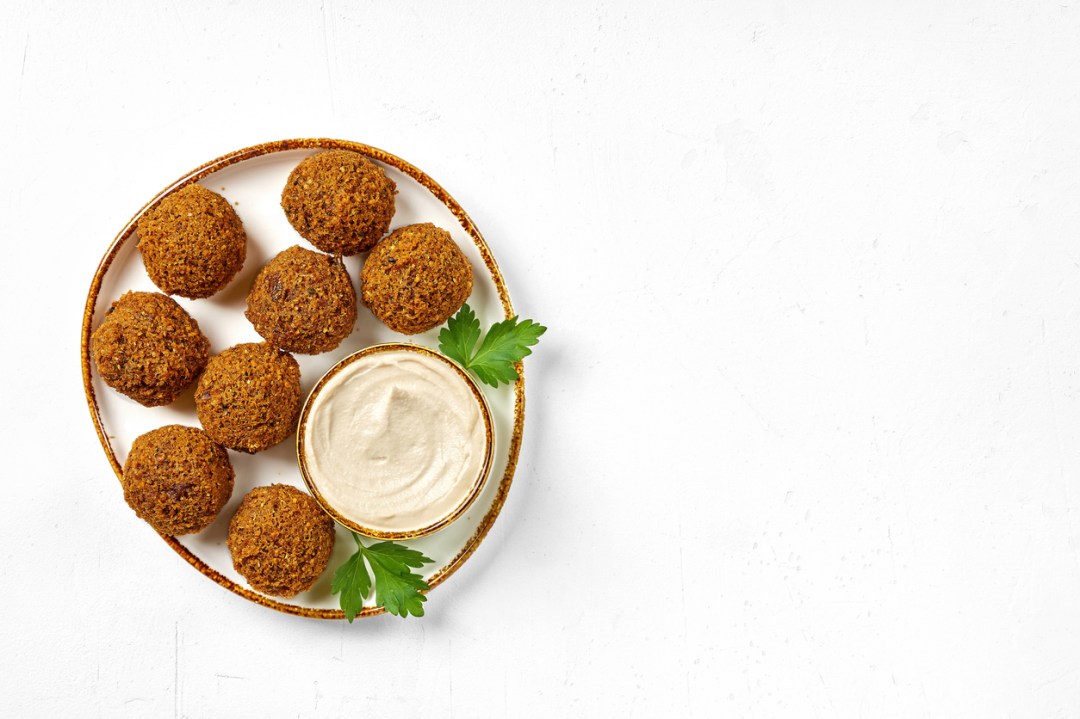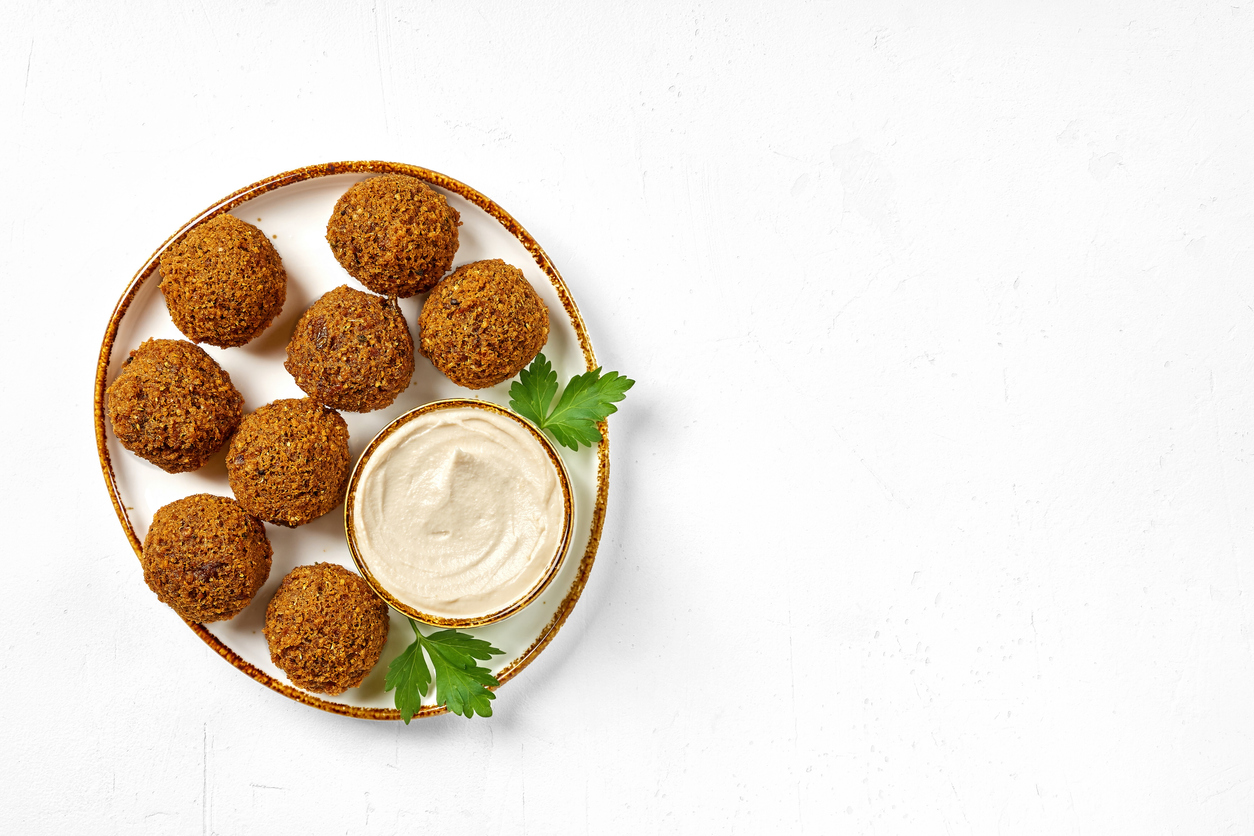The service was stylish, the menu superb, the vibe effortlessly chic. This was the Coal Office, one of London’s best Israeli restaurants, situated in the old Victorian goods yard at King’s Cross. My fiancée and I dined there last week. It was a blast. But something didn’t feel right.
Fish and chips was invented by an Ashkenazi Jew, and we all like a good kedgeree or a korma, yet British food is no fiction
In many ways, you couldn’t find a more Israeli establishment. Weeks earlier, In Jerusalem, I had taken my children to the Coal Office’s sister restaurant, Machneyuda. The same type of stuff was on the plate: Sephardi spices, chickpeas and aubergines, matched with Ashkenazi bread and fish. The atmosphere was similar, too. In Israel, the maître d’ had argued over my booking; in London, I rowed with the chef, who then apologised for being ‘too Israeli’. Conciliatory shots of arak were doled out both times. As in Jerusalem, so, in King’s Cross.
But here we come to the crunch. According to Coal Office’s website, it offers ‘an immersive dining experience mirroring the unique, engaging traditions found throughout the Middle East and Mediterranean’. But where, exactly, is the cuisine from? On the site of this Israeli restaurant, the word ‘Israel’ is nowhere to be seen.
The Coal Office isn’t alone in this. Most Israeli restaurants are bashful about their origins. Miznon, which has branches in Notting Hill and Soho, describes itself as ‘bringing the flavours of the Mediterranean to London’s most vibrant neighbourhoods’; Honey & Co presents ‘food from the Middle East’; and the three Good Egg restaurants offer ‘Middle Eastern inspired dishes’.
This bothered me. So I called the Coal Office’s head chef, Dan Pelles. ‘We like to call our food modern-day Jerusalem cuisine,’ he told me. ‘Israel has only been there for 75 years, so that’s not enough years to separate it from Italian or French cooking.’ But the ancient kingdom of Israel was established 3,000 years ago, I thought. Wasn’t the restaurant avoiding the term ‘Israeli’ to sidestep inevitable anti-Israel sentiment? ‘I have no comment in that regard,’ Pelles said.
For decades, Israeli culture has been attacked as a way to undermine Jewish legitimacy in the Middle East. That’s where the gastronomy wars come in. Take Akub, a fashionable Palestinian restaurant in Notting Hill. In an interview with the New York Times, its French-trained chef and founder, Fadi Kattan, said his mission was to reclaim a cuisine that is part of a broader Arab tradition that he felt was being co-opted by Israeli cooks. ‘Food is being used to normalise the Israeli occupation by denying the origin of everything from hummus to falafel,’ he told the newspaper.
This idea of Israelis using food to ‘normalise’ and ‘co-opt’ relies on a highly selective view of history. As one reader remarked in the comments section of the NY Times piece: ‘Jews have also been making these foods for centuries and have appropriated nothing. There’s been a continuous Jewish presence in the land of Israel for thousands of years.’
The aim of portraying Israel as a colonial imposition on indigenous people, a ‘settler-state’ expropriating their land and culture, is for the country to become rootless and collapse. Saul Bellow compared the pernicious process to the dislodging of a tooth: ‘They will work it back and forth and when it is sufficiently loose they will take it out with their fingers.’
One of London’s few Israeli joints that is truly loud and proud has suffered as a consequence. Chef Eran Tibi set up Bala Baya as a ‘Middle Eastern’ restaurant in Southwark in 2017, but a crisis of conscience led him to rebrand it as ‘Israeli’ two years later. ‘I wanted to be more authentic to my heritage, so I decided to be bold and come out,’ he told me. ‘I put Hebrew on the walls, on the menu and on the website. I was attacked terribly.’
Bala Baya was hit by telephone threats, hundreds of fake negative reviews on Google and even a demonstration outside. ‘It was tough,’ Tibi said, ‘but my customers were blown away by it. They had heard so much about food in Tel Aviv and they wanted to try it… This is not politics, it’s a restaurant.’ In March, he opened another unapologetically Israeli venture, Kapara, in Soho.
Not every story has a happy ending. When another London restaurant – which I won’t name – branded itself Israeli, cyber-attacks deleted its Instagram account, which had 30,000 followers. It has since gone back to ‘Middle Eastern’.
Israeli cuisine is, of course, a melting pot, encompassing influences from the Levant, North Africa and the wider Middle East, as well as European culinary traditions. But that doesn’t erase its existence. Fish and chips was invented by an Ashkenazi Jew, and we all like a good kedgeree or a korma, yet British food is no fiction.
Consider Ceviche Soho, the excellent Peruvian restaurant in Soho. Peru has 491 national dishes, more than any other country. These include Spanish recipes from the conquistadores, meat dishes from African slaves, stews cooked underground in the Inca tradition, and raw fish and stir-fries from Japanese and Chinese immigrants. Peru’s human rights record is woeful. This year alone, its armed forces and police carried out thousands of extrajudicial or arbitrary killings and other egregious abuses. Yet the restaurant is proud to label itself as Peruvian.
The thousands of Chinese restaurants in Britain are similar. China is the size of a continent, and its cuisine is deeply diverse and localised. Modern China is home to a range of ethnic minorities, with some, such as the Uighurs and the Tibetans, subjected to the most brutal repression. It is a police state that is engaged in subversion and espionage in Britain. But nobody’s Chinese takeaway is forced to rebrand itself as Asian.
Israelophobia: The newest version of the oldest hatred, by Jake Wallis Simons (Constable, £12.99), is out on 7 September and can be pre-ordered now.







Comments